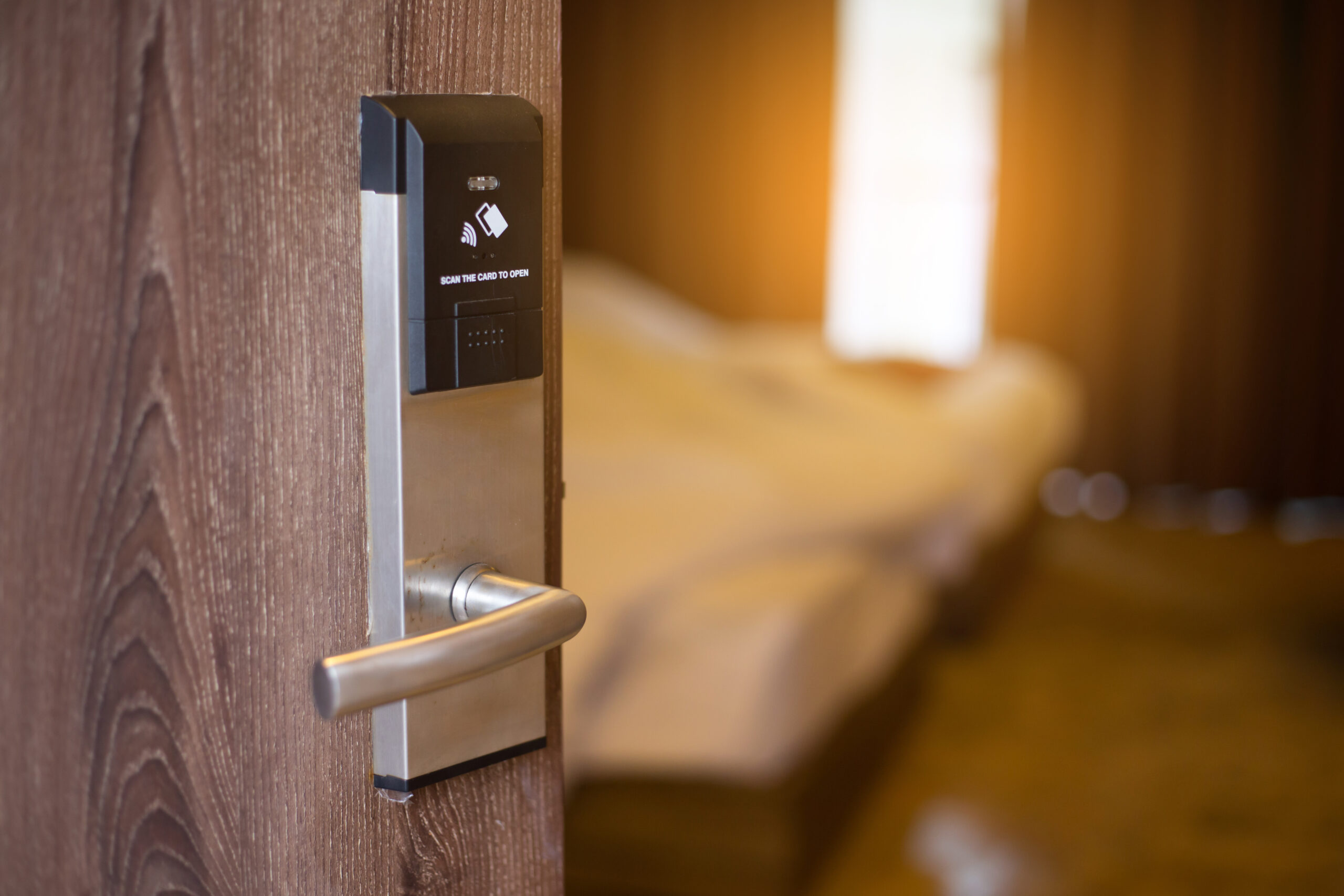Traveling safe is not just about gadgets and GPS, it’s also about common sense, say these experts
Laura S. is a travel planner who often finds herself in unfamiliar cities in the US and abroad on hotel site inspections and destination FAMs.
“I always ask for a room between floors three and seven—not ground floor and not too high,” she says. On one occasion, however, the hotel had booked her on the ground floor of a hotel which was also near the garage, a security no-go because of its easy proximity to possible bad actors. The hotel was making it difficult for her to move rooms so she moved to a different hotel across town.
“If I don’t feel safe that’s a deal breaker,” she says.
Watch More: The Art of Badassery author Jennifer Cassetta presents the shortest women’s self defense class ever
Women on the road often find themselves making similar decisions. Recently, social media has featured examples of women taking security issues into their own hands: using luggage trackers in their shoes to make sure they are always on a known grid, adding extra security to bolt locks with various devices and even just using chair jams.
An Ex-Navy Seal On Staying Safe
“Women traveling alone are definitely targeted more than men,” says Harding Bush, senior manager for security operations, Global Rescue and former Navy Seal. He shared the statistics that 50% of business travelers are women and 80% say they have some security issue during travel.
Bush says one of the most important things a woman can do to ensure her safety is to “do your research before you travel, especially when it’s an international trip. Talk to people who have been there and be specific with your questions: ask what were the three best things that happened and what are three things you could have done better.”
Read More: Tips to Stay Secure on the Road
Bush also says it’s important to make sure you are aware of cultural differences and legal issues in different parts of the world. “The Middle East has been doing business with the West forever, but you have to be aware of women’s issues in those countries, especially when it comes to legal rights. When you travel in those countries you are under their legal system.”
He also says bluntly, “Try not to travel alone if you can help it. I’m an ex-Navy seal and I’m not traveling alone.”
Other tips: business class gets you out of the airport more quickly and airports are where potential wrong doers are scouting for opportunities. Ask your car service to have your company name, not your personal name on the arrival card.
Read More: Event Safety PSA: Failing to Prepare Could Cost You
If you are planning on taking an Uber and you are arriving in an unfamiliar destination, rethink that option and get a car service arranged.
“I am not a big fan of Uber,” Bush says, noting the fact that drivers are not employees of the company but free agents. “Uber is convenient,” he says, “but the most dangerous thing you’ll do anywhere in the world is get into a car.” He says if you must take an uber, use a GPS app like Waze which can show you where you are in real time as the driver progresses.
“Hacks like using a luggage tracker in your shoe is not proactive enough,” he says. “And by the time someone finds you, the damage can have been done. We want to avoid the conflict not manage it. It’s all about making good decisions all along the way.”
When staying at a hotel, Bush says to choose a known quantity: a brand that has a reputation for caring about solo female travelers’ safety.
“You should be given your key by a staffer who does not say your room number out loud. You want to be in a hotel where you have to swipe your room key in the elevator to access your floor and elevators from the garage should not access room floors.”
The old adage about not staying on ground floors is true, Bush says. “Ground floor has easier access. You also don’t want a room at the end of a corridor if you can help it or near the elevator.”
Another way to choose safe stays is to stay away from hotels that function as social spots for non-hotel guests: whether it be a beach, restaurant or bar. These places are fun to socialize in but they increase the likelihood of being hassled or interfered with by someone who is not staying at the property.
When you are in your room, Bush says, stay secure by using the door stopper in the room door along with the deadbolt. Make sure your balcony doors are always shut and locked when you leave the room or go to sleep at night.
Advice from a Woman Expert
Erika Weisbrod is security director of intelligence and assistance at International SOS. “The level of risk associated with any kind of travel varies depending on a person’s travel profile and their destination. When female travelers embark on a business trip, there are multiple precautions that should take place and it starts when booking travel,” she says.
“The first step to ensuring a safe trip as a female traveler is to research your location to understand the risks of the destination. Research should include the local security risks such as crime or civil unrest, mapping out where there might be hot spots or no-go zones within the location and identifying secure modes of transportation for getting from A to B. It is also important to be aware of any local holidays, sensitive dates, planned or ongoing developments, such as protests, and the risk of natural hazards. Cultural etiquette should also be factored in as it can help determine the appropriate attire to pack, and the role of women in the local society.
Read More: When Mother Nature Is an Unwanted Attendee at Your Meeting or Event
“When booking travel, it is always advised to plan to arrive to the destination during daylight hours, so that the traveler can more easily orient to their new environment. The next step is to choose a hotel and select a room with security in mind. When business travel managers or business travelers are researching accommodations, they should consider the vicinity of the hotel, and the hotel’s security measures relevant to the local risk environment.
At a minimum, this should include a 24/7 reception and security surveillance of entrances, the lobby and the property grounds. Consideration should be given to on-property dining or room service options in case it is not safe, or the traveler does not feel comfortable, to leave the hotel after dark. Choosing a hotel with multilingual staff will also help a traveler that is unfamiliar with the native language if they need anything, or in case anything goes wrong.
“When checking into the hotel, female travelers should request a room that is on the 4th-7th floors. Lower-level floors, especially the ground floor, can be more easily accessed by others; higher floors can prove more difficult to escape if needed due to fire or other emergency. Hotel rooms should include a working deadbolt lock, a chain or latch, a peephole, a safe and an in-room telephone. An additional measure to deter unwanted entry is to bring a door stop on your trip and place it on the inside of the front door to prevent forced entry.”
Weisbrod says that once at your accommodation, female travelers should be sure to conduct the following protocols:
- Avoid sharing information: When traveling, you may meet many different people. It is important to not share your personal information, accommodations or room number, or if you are traveling alone, including with hotel staff.
- Verify before opening the door: Do not open the door unless you are certain of who is on the other side. If a person claims to be housekeeping or maintenance, but you are unsure, call the front desk to double-check prior to letting them inside.
- Know what to do in case of an incident/emergency: If something does not seem right, let someone know. Have key numbers, such as local emergency numbers, pre-programmed in your phone and in hard copy. Familiarize yourself with emergency exits and any shelter or assembly areas at the property so you know what to do if you hear an alarm.
Weisbrod says that, “While Duty of Care requires an employer to be responsible for traveler safety, these are simple protocols that a traveler can do to help themselves during a business trip. The more prepared the traveler is, the more opportunities they have to mitigate risks they are likely to encounter.”




